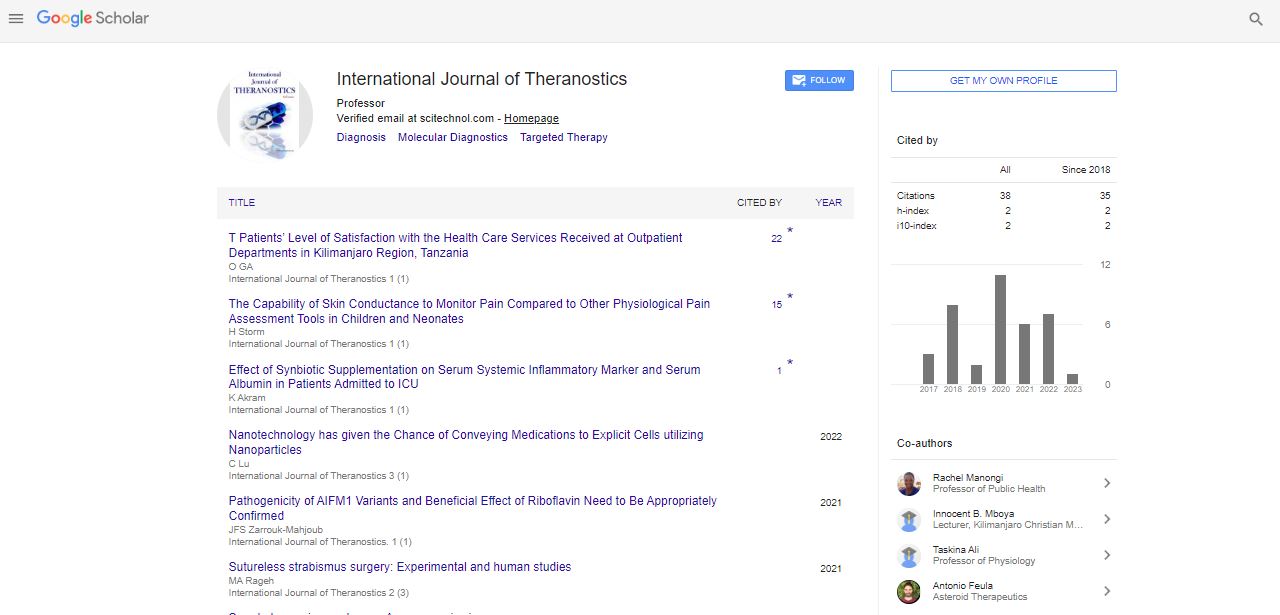Perspective, Int J Theranostic Vol: 12 Issue: 2
Evolving Pharmacotherapy Landscape and Future Horizons
Convery Manuel*
1Nanotheranostics Laboratory, Sorbonne University, Paris, France
*Corresponding Author: Convery Manuel,
Nanotheranostics Laboratory,
Sorbonne University, Paris, France
E-mail: Manuelvery1991@hotmail.com
Received date: 29 May, 2023, Manuscript No. IJT-23-106985;
Editor assigned date: 31 May, 2023, PreQC No. IJT-23-106985 (PQ);
Reviewed date: 14 June, 2023, QCNo IJT-23-106985;
Revised date: 21 June, 2023, Manuscript No. IJT-23-106985 (R);
Published date: 30 June, 2023, DOI: 10.4172/IJT.1000131
Citation: Manuel C (2023) Evolving Pharmacotherapy Landscape and Future Horizons. Int J Theranostic 12:2.
Description
Pharmacotherapy, the use of medications to treat diseases and improve patient health, is a cornerstone of modern medicine. This study provides a comprehensive review of pharmacotherapy, covering its principles, advancements, challenges, and future perspectives. It explores the evolution of pharmacotherapy, from traditional drug development to the emergence of personalized and precision medicine approaches. Additionally, it discusses the challenges in drug discovery, the impact of pharmacogenomics, and the potential of innovative therapies to transform patient care.
Pharmacotherapy encompasses the use of pharmaceutical agents to manage diseases and alleviate patient symptoms. This section introduces the fundamental principles of pharmacotherapy and its important role in modern medical practice.
Evolution of pharmacotherapy
Traditional drug development: Historical milestones in drug discovery and development, from herbal remedies to the isolation of active compounds, have laid the foundation for modern pharmacotherapy.
Rational drug design: Advances in molecular biology and pharmacology have enabled rational drug design, where medications are specifically developed to target molecular pathways involved in disease pathogenesis.
Personalized and precision medicine: The shift towards personalized and precision medicine tailors pharmacotherapy based on individual patient characteristics, such as genetics, lifestyle, and disease subtype.
Advancements in pharmacotherapy
Biologics and targeted therapies: Biologics and targeted therapies have revolutionized the treatment of various diseases, including cancer, autoimmune disorders, and rare genetic conditions.
Immunotherapy: The emergence of immunotherapy has significantly impacted oncology, harnessing the immune system to combat cancer cells.
Gene therapy: Gene therapy holds accuracy in correcting genetic defects and treating genetic disorders by introducing therapeutic genes into patients.
Challenges in drug discovery
High cost and lengthy process: The development of new drugs involves substantial financial investments and extended timelines, leading to challenges in bringing cost-effective medications to the market.
Drug resistance: The emergence of drug-resistant pathogens and cancer cells poses significant challenges in maintaining the effectiveness of pharmacotherapy.
Safety and adverse effects: Pharmacotherapy may be associated with adverse effects and potential drug interactions, necessitating thorough safety evaluations.
Pharmacogenomics: Personalizing drug therapy
Genetic variations and drug response: Pharmacogenomics studies the influence of genetic variations on drug metabolism, efficacy, and adverse reactions, enabling personalized drug selection and dosing.
Implementation in clinical practice: Integrating pharmacogenomics into routine clinical practice enhances medication safety and improves treatment outcomes for patients.
Future perspectives in pharmacotherapy
Drug repurposing: Drug repurposing involves identifying new therapeutic uses for existing medications, accelerating drug development and reducing costs.
Artificial intelligence and drug discovery: Artificial intelligence and machine learning technologies have the potential to streamline drug discovery processes and identify novel drug targets.
Nanotechnology and drug delivery: Nanotechnology-based drug delivery systems offer targeted and controlled release of medications, improving therapeutic efficacy and reducing side effects.
Impact of pharmacotherapy on global health
Access to medications: Ensuring equitable access to essential medications is an important for addressing global health disparities.
Antimicrobial resistance: Pharmacotherapy plays a vital role in combating antimicrobial resistance, requiring a coordinated global effort to preserve the efficacy of existing antibiotics.
Conclusion
Pharmacotherapy remains central to modern medicine, continually evolving to meet the healthcare needs of patients worldwide. Advances in drug discovery, pharmacogenomics, and innovative therapies hold efficacy for personalized and precise pharmacotherapy. Addressing challenges, promoting drug accessibility, and embracing emerging technologies will shape the future of pharmacotherapy and contribute to improved patient outcomes and global health.
 Spanish
Spanish  Chinese
Chinese  Russian
Russian  German
German  French
French  Japanese
Japanese  Portuguese
Portuguese  Hindi
Hindi 